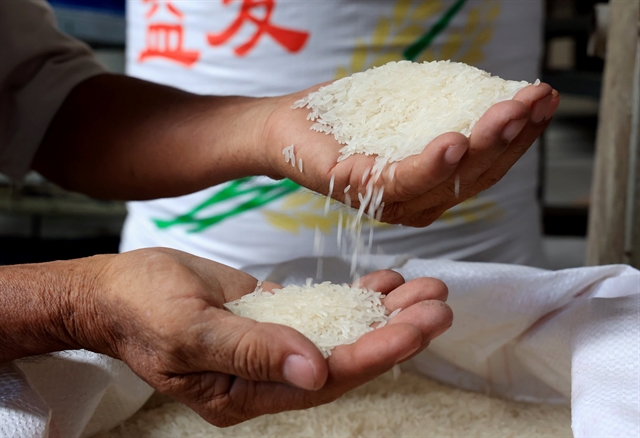
|
| Vietnamese export rice to China. Việt Nam expects to export about 8 million tonnes of rice this year, earning more than $5 billion. —VNA/VNS Photo |
HÀ NỘI — Việt Nam has many opportunities to promote rice exports in the second half of this year, even though India could change its rice export policy in the next few months, according to the Ministry of Industry and Trade (MoIT).
India is considering easing restrictions and allowing the export of white rice with a fixed tax rate. In addition, the authorities can also abolish the 20-per-cent tax on parboiled rice exports and apply a fixed tax rate for this product.
India’s five-per-cent broken parboiled rice was offered at US$539-545 per tonne last week.
The ministry said that if India abolishes and relaxes its rice export policies, rice prices will fall.
However, the demand for rice in countries around the world is still high, so Việt Nam still has many opportunities to promote rice exports in the remaining months of 2024.
Việt Nam’s five-per-cent broken rice was offered for sale at $565-570 per tonne on July 12, the lowest level in more than half a year.
While rice export prices from Việt Nam fell to their lowest level in a year, Thai rice prices also fell due to weak demand and the market is waiting for the possibility of that decision from India.
Specifically, Thailand’s five-per-cent broken rice dropped to $570-575 per tonne, the lowest level since early April, down from $585 last week.
However, Việt Nam’s export rice price still increased by nearly 10 per cent over the same period. According to the Import-Export Department, MoIT, after a long period of export prices rising, the fall in Vietnamese rice price was simply down to the trend of the global rice price.
If the relaxation of India’s rice export policy is approved, the global rice supply is expected to increase. So, the rice prices in Asia are likely to cool down, because India is still a large rice exporter in the world with over 20 million tonnes each year.
Việt Nam’s rice exports in the first six months of 2024 was still a bright spot, with volume of 4.68 million tonnes and turnover of $2.98 billion, up 10.4 per cent in volume and 32 per cent in value over the same period last year.
The Ministry of Agriculture and Rural Development (MARD) expects Việt Nam to export about 8 million tonnes of rice this year, earning more than $5 billion.
In the last months of the year, the main export markets of Vietnamese rice were still the Philippines, Indonesia, China, Ghana, Malaysia, and Singapore.
The success of the rice sector is the fruit of a concerted effort spanning research, production and trade, with high-quality seeds delivered to farmers’ hands, former Minister of Agriculture and Rural Development Cao Đức Phát said.
Phát, who is chairman of the Board of Directors of the International Rice Research Institute (IRRI), said the market now needs resilient, low-emission and quality rice varieties that adapt to climate change, adding that related research should help farmers achieve higher selling prices.
Deputy Minister of Agriculture and Rural Development Phùng Đức Tiến affirmed that the ministry now places top priorities on high-quality seed production, major export products and the formation of quality varieties with high yields, which are disease-resistant and can adapt to different climates.
Director of the Vietnam Academy of Agricultural Sciences, Nguyễn Hồng Sơn, meanwhile, attributed the country’s remarkable development in the rice industry to three major achievements. These include the diversification in plant genetic research disciplines, a research workforce that matches regional standards and the robust growth of the domestic seed industry.
Sơn suggested businesses commission research from institutes because each firm has different foundations in terms of rice varieties, working capabilities and investment goals. Investing in research from the outset allows new products to best meet business objectives.
However, public-private partnerships (PPP) between the sides face challenges due to Government Decree No. 70/2018/NĐ-CP, on planning the management and use of state property formed through implementing scientific and technological tasks using state funds. As per the decree, companies do not have ownership rights over rice varieties even if they contribute to the research process.
According to Trần Kim Liên, chairwoman of the Vietnam Seed Group (Vinaseed), the regulation against transferring exclusive varieties makes it difficult to advance public-private partnerships. Delays in the adoption of a new variety and difficult resources mobilisation occur when all businesses involved await transfer approval after the recognition of the variety.
Liên has proposed MARD promptly issue a list for transferring plant variety rights to businesses. Simultaneously, transparent technology transfer should take into account business participation based on conditions and needs. The ministry also needs to provide early guidelines on public-private partnerships to mobilise social resources for rice breeding research.
Acknowledging the challenges, Nguyễn Thị Thanh Thủy, director of the MARD’s Department of Science, Technology and Environment, noted that the decree poses significant obstacles to research institutes in their plant variety transfers to businesses. However, the intellectual property law has eased such bottlenecks by granting plant variety ownership upon registration. — VNS
- Reduce Hair Loss with PURA D’OR Gold Label Shampoo
- Castor Oil Has Made a “Huge” Difference With Hair and Brow Growth
- Excessive hair loss in men: Signs of illness that cannot be subjective
- Dịch Vụ SEO Website ở Los Angeles, CA: đưa trang web doanh nghiệp bạn lên top Google
- Nails Salon Sierra Madre
 VnExpress News The News Gateway of Vietnam
VnExpress News The News Gateway of Vietnam




